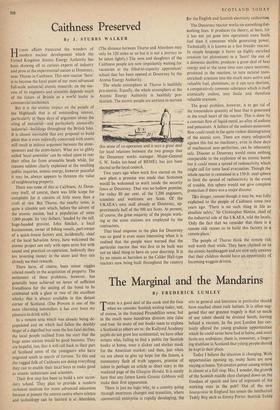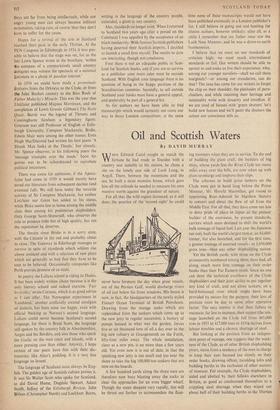The Marginal and the Mandarins
By FREDERICK LUMLEY TJERE is a good deal of the mask and the face when we consider Scottish writing today, not, of course, in the frenzied Pirandellian sense, but in the much more humdrum division into false and true. So many of our books seem to explore a Scotland as others see us; the Kailyard Academy pupils do not grow less sentimental; we have other writers who, failing to find a public for Scottish books at home, wear a slicker and starker mask for the American market; and then, just when we are about to give up hope for the future, a momentary flash of truth appears, promise of talent in perhaps an article or short story in the weekend page of the Glasgow Herald. It is surely here that any future Lewis Grassic Gibbons will make their first appearance. TJERE is a good deal of the mask and the face when we consider Scottish writing today, not, of course, in the frenzied Pirandellian sense, but in the much more humdrum division into false and true. So many of our books seem to explore a Scotland as others see us; the Kailyard Academy pupils do not grow less sentimental; we have other writers who, failing to find a public for Scottish books at home, wear a slicker and starker mask for the American market; and then, just when we are about to give up hope for the future, a momentary flash of truth appears, promise of talent in perhaps an article or short story in the weekend page of the Glasgow Herald. It is surely here that any future Lewis Grassic Gibbons will make their first appearance.
There is just no logic why, in a country going through enormous changes and transition, where commercial enterprise is rapidly developing, the arts in general and literature in particular should have reached about rock bottom. It is often sug- gested that our greatest tragedy is that so much of our talent should be drained South, leaving behind a vacuum. In the past London has cer- tainly offered the young graduate opportunities which he could never have had at home, and most Scots are ambitious; there is, moreover, a linger- ing tradition in Scotland that young people should be kept in their place.
Today I believe the situation is changing. With opportunities opening up, many Scots are now staying at home. Yet creative power among writers is almost at a full stop. Has, I wonder, the. growth' growt of the Scottish middle class clamped down on the freedom of speech and love of argument of the working man in the pub? Out of the new bourgeoisie in England has arisen the intellectual Teddy Boy such as Jimmy Porter. Scottish Teddy Boys are far from being intellectuals, while our angry young men can always become militant nationalists, taking care, of course,'that they don't have to suffer for the cause.
Hopes for a revival of the arts in Scotland reached their peak in the early Thirties. At the PEN Congress in Edinburgh in 1934 it was pos- sible to believe that the stage was set, for as the late Lewis Spence wrote in the brochure, 'within the compass of a comparatively small country (delegates may witness the' spectacle of a national literature in a phase of peculiar interest.'
In 1934 we could have made a promenade litteraire from the Orkneys to the Clyde, or from the John Buchan country to the Bass Rock of Father Malarhy's Miracle. This was the year that Linklater published Magnus Merriman, and the completion of Lewis Grassic Gibbon's The Scots Quair. Barrie was the legend of Thrums and Cunninghame Graham a legendary figure; Grierson was still Professor of English at Edin- burgh University. Compton• Mackenzie, Bridle, Edwin Muir were among the other names. Even Hugh MacDiarmid had written his best poem 'A Drunk Man looks at the Thistle,' but already, Mr. Spence observes, in his following poem the `message triumphs over the mode.' Soon his genius was to , be subordinated to reprobate political intentions.
There was cause for optimism; if the Apoca- lypse had come in 1939 it would merely have saved our literature from subsequent decline (and eventual fall). We still have today the versatile activity of Sir Compton Mackenzie, but neither Linklater nor Gunn has added to his status, iwhile Blake seems less at home among the middle class than among his proletarian shipbuilders. Only George Scott-Moncrieff, who observes the rule to produce little but of high quality, has not the reputation he deserves.
The theatre since Bridie is in a sorry state, with the Citizens in the red and probably about to close.. The Gateway in Edinburgh manages to survive in spite of standards which seldom rise above amateur and with a selection of new plays which are generally so bad that they have to be seen to be believed. Occasionally companies like Perth provide promise of an oasis.
In poetry the Lallans school is riding its Dadas. It has been widely written about because it is the only literary school and indeed exercise. 'Fair les ecoles,' wrote Cocteau, which is as good advice as I can offer. The Norwegian experiment in `Landsmal,' another artificially created amalgam of dialects, has been none too happy, even with official backing as Norway's second language.
Lallans could never become Scotland's second language, for there is Braid Scots, the language still spoken by the country folk in Aberdeenshire, Angus and the Borders, and also those who speak the Gaelic on the west coast and islands, with a more pressing case than either. Anywdy, I hope certain of our poets have fun with their dic- tionaries; like Alice's pudding, it is a very fine language toinvent.
The language of Scotland must always be Eng- lish. The golden age of Scottish culture proves it. - It was Sir Walter Scott who spoke for Scotland, as did David Hume, Dugdale Stewart, Adam Smith, Jeffrey of the Edinburgh Review, John Wilson (Christopher North) and Lockhart. Burns, writing in the language of the country people, coincided, a giant in any country.
Alas, standards no longer exist. When I returned to Scotland two years ago after a period on the Continent I was appalled by the acceptance of so mbch mediocrity. With famous Scottish publishers having deserted their Scottish imprint, I decided to launch a small firm myself. The results to date are interesting, though not conclusive.
First there is not an adequate public in Scot- land for Scottish books,' and if you are to survive as a publisher your main sales must be outside Scotland. With English your language there is no question of being in the happy position of the Scandinavian countries. Secondly, to sell outside Scotland your books must have a general appeal, and preferably be part of a general list.
As for authors we have been able to find manuscripts which would certainly not come our way in fierce London competition; at the same time none of these manuscripts would not have been published eventually in a London publisher's list. I still believe in going out and hunting for elusive authors, however unlikely; after all, as a child I remember that my father once saw the Loch Ness Monster, and he was a down-to-earth businessman.
I believe that we must set our standards of criticism high; we must reach international standards or fail. Our writers should be able to uproot us and make us live their experience; who, among our younger novelists—shall we call them marginals?—or among our mandarins, can do that? The time has come for our writers to forget the chip on their shoulder, the platitudes of paro- chialism, and while retaining their heritage and nationality write with sincerity and intuition. If we are tired of houses with `green shutters' let's build new houses and we'll paint the shutters the colour our conscience tells us.











































 Previous page
Previous page